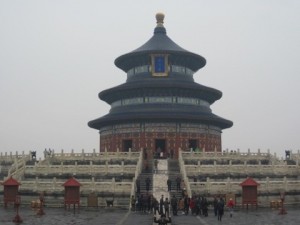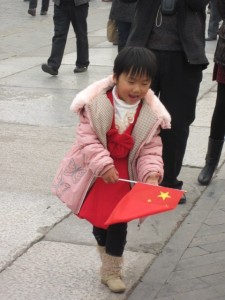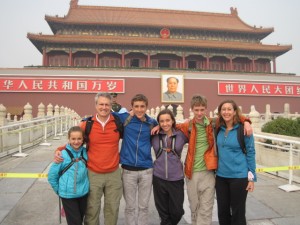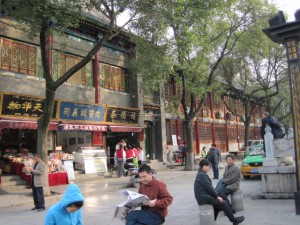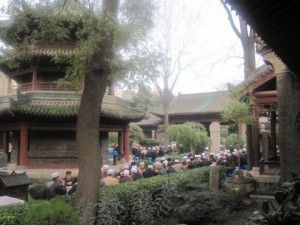Europe, Asia and an Unnecessary Discussion of Aesthetics
November 18, 2011
We are only a week into the trip to Asia, but the contrast between it and the 8 weeks in Europe is becoming clear.
The architecture in Europe is part of our vocabulary. Heck, even the odd structures (which the Eiffel Tower originally was) are deeply, almost viscerally, familiar. The structures we have seen in China are wonderfully fresh, even when ancient.
In Europe, our travel patterns were much more predictable. We visited museums and churches. We studied history and art. We spoke with natives about their lives.
In Asia/China, I have no sense of itthes history, so we are not learning the Dynasties like we learned the English monarchs. Instead, we are gathering tidbits of history, but not in a greater context. We know that almost every structure here has burned as the result of some war or battle, but we lack an organizing timeline.
In both places, communism has been a huge part of the recent history. [Note: when I say “recent”, I mean to Susie and me. For the kids, Reagan might as well have been Roosevelt. We remember the fall of the Berlin Wall. We even traveled behind the Iron Curtain as high school and college students.] It is so interesting to see how this failed economic experiment has evolved in the two continents. Eastern Europe is racing to embrace the economies and politics of Western Europe and even the US. In fact, Hungarians are much more pro-capitalism than the French.
China, on the other hand, still waves the red flag, displays images of Mao and sells the Little Red Book.
But do not be fooled, this country feels like an unbridled free market economy. In 2007, the government passed a law that made private property easier to own. They, however, do not provide the political freedoms of the west - free press, free speech, free assembly. Thus China has become a fascinating experiment - can a country embrace the free market with absolute vigor while eschewing personal freedoms? Can a nation be economically free, but politically restricted? I am not aware of any other nation attempting to find this combination.
[Ironic note about Communism in both countries. If you look closely at the bottom, right hand corner of the poster from Prague, you will see these words “Above McDonalds”. Next to the Forbidden City, there are posted maps of Central Beijing and Greater Beijing with all the major tourist sites . . . and every McDonalds listed. I am not sure exactly why this amuses me so, but it does. I guess Big Brother is no match for Big Mac!]
Chinese art is deeply appealing to me, but I do not know its aesthetic theory. As a result, we all look at pieces with the eyes of children and simply say, “what do you think?”. In Europe, I found myself often saying “that is a masterpiece . . . no, I do not know why or who exactly decided it is a masterpiece, but it is!” Here, we either like it or not based on our gut feel.
[Warning: Unnecessary Rant on Art]
Without going into a debate on aesthetics, let me say the following: too much Western modern art is too clever for me. Do not get me wrong, I actually prefer the modern art museums to those featuring Rembrandt and Singer Sargeant. Yet there are paintings that espouse the virtues of the process more than the product. I think the idea of Jackson Pollack spraying paint on a canvas in a act of artistic euphoria is awesome. I also like the idea of cubism – seeing an abject from multiple angles in a way that suggests motion. In theory, they are fascinating and brilliant, yet in the observation they fall short for me. When I look at them I feel the same way I do when I listen to the most inaccessible of Miles Davis bop music – perhaps if I were smarter/more sensitive/more enlightened I would appreciate it. At times, I want to pretend that I do, but the fact is that most of it escapes me. Once again, I love modern art, but some of it is a complete whiff for me.
I am glad that you let me get that off my chest.
So far, the Chinese art is subtle, but accessible. If there is a modern equivalent to artistic deconstruction, I am unaware of it.
[End of rant. Back to the Europe/Asia comparison.]
Chinese art and architecture tends to be more subtle and intricate than its Western counterparts. I do not think there is not an equivalent to a Wagner opera in China. Big is not better here. The scrolls, the calligraphy and even the architecture seem to favor fine details rather than massive statements.
We walked everywhere in Europe, but the strolls here are simply more foreign. Not only do the signs use characters we do not recognize, but also the items sold are often unrecognizable. Judging by some of the street food, the animals here have parts that simply do not exist in the West.
In Europe, we blended in. Here, we turn heads, as I have documented previously.
In Europe, we often had to pay to use a bathroom. Here, we would pay to avoid them.
Our kids are appreciating the change in teaching styles. Since we are spending less time in museums and we are not familiar with Chinese history, we are learning in a more extemporaneous way. In other words, we are strolling, observing and commenting.
As a group, the Chinese people seem to have a better work ethic than their European counterparts. They also long to have the things that we take for granted (fashion, music, etc).
Perhaps the biggest difference in the two trips has been our overnight accommodations. Throughout Europe, we rented apartments. Doing so was simply the most economical option. Hotels were prohibitively expensive, especially since we would need 2 or 3 rooms every place we went. Hostels were charging $50+ per person and we could rent an apartment for less than $200 for all 6 of us that would have security and internet. Here, there is no “Vacation Rental by Owner”, we have opted for hostels. The experience could not be more different. The apartments made our travels private. The hostels make us communal. We are making friends from all over the world: Argentina, Uganda, Denmark, China, and even Texas in the lobbies and cafes of the hostels. The kids are playing ping pong and pool with each other and fellow travelers. The people working at the hostels here are nice to a fault. Were I in their shoes, I might tire of having people speak a different language to me every day, but they remain upbeat and nice. At the Happy Dragon, we became incredibly fond of Betty, Elsie and Peach who seemed legitimately delighted to see us (and help us) every day.
Day 1 in Xi’an
After our train ride to Xi’an, we did some planning for the next several weeks. For those of your who are not yet sure that we are insane to try this trip, let me share a little information that might persuade you that we are, in fact, fools. Eight days prior to our departure, we had not booked a single hotel for our 14 week trip. Even now, we are booking the trip as we go. Getting reservations for the next 4 weeks was part of the morning/early afternoon project.
Once that was done, we walked through the Muslim Quarter of Xi’an. I have not idea how a Muslim quarter continued to thrive despite the anti-religion focus of communism, but there we were. This area was so fun. Every other storefront offered street food. One of Susie’s seasoned traveller friends told us that the street food is OK as long as you take a Pepto-Bismal in advance.
We took our Pepto-Bismal tablets and made the street into a buffet.
We had rice-based sweets, skewers of beef, sandwiches with spicy pork, puff pastries filled with rice and dried kiwis. No one is sick yet. I hope I can report the same in 2-3 days.
We then came upon the Great Mosque, which is actually more like a series of structures that serves as a monastery. It was an odd place: serene, actively used, somewhat disheveled and friendly. We arrived as many of the congregation (is that the right word for a Muslim community?) was eating dinner. They did not seem bothered by our presence as they happily ate and talked, with the men and women eating separately.
After the tour, we found ourselves in an active and highly competitive market. Liam was in negotiating heaven. We bought some stuff that will clearly make an appearance at camp. Liam must have done well negotiation since the vendors all shook their heads and shook his hand.
After all the massive sites in Beijing, the understated nature of the Mosque was refreshing.
We returned to our hostel to avail ourselves of its amenities, including free dumpling night, wifi internet and ping pong. Virginia has befriended everyone that will speak with her. She has clearly avoided any shyness issues.
Tomorrow, we attack the terracotta warriors. Should be a blast.
Steve Sir

